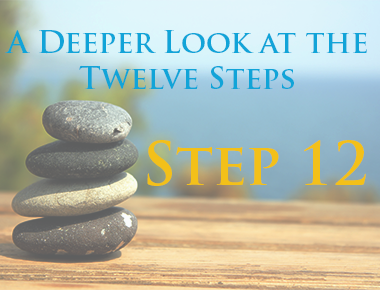
A Deeper Look at the 12 Steps: Step 12
“Having had a spiritual awakening as the result of these steps, we tried to carry this message to alcoholics, and to practice these principles in all our affairs.”
When someone enters a California residential alcohol detox center, they’re looking for help. They feel powerless. They can’t seem to stand on their own two feet. Many have hit rock bottom.
By the time they reach the final step of the Alcoholics Anonymous program, they’ve not only kicked the habit but, also, grown in strength and maturity. Now they’re ready for the final step—applying what they’ve learned to their daily lives and then using it to help others overcome their addiction.
Finding Joy in Giving
“The joy of living.” That’s how Bill W., author of the Big Book, otherwise known as the Alcoholics Anonymous manual, describes the essence of Step 12. Written back in 1939, the Big Book remains as relevant today as it was nearly 80 years ago.
Bill W. has boundless praise for the final step: “Practically every A.A. member declares that no satisfaction has been deeper and no joy greater than in a Twelfth Step job well done.” What’s the secret to unlocking this sense of gratification and contentment? The power of Step 12 rests in the age-old saying that it’s far better to give than to receive.
The world says happiness comes when other people give us things—love, gifts, money, attention. A.A. members who complete Step 12 usually find the opposite to be true. When they give back to others, they overcome their own self-imposed isolation. They build new relationships based on selfless caring. In doing so, they expand their hearts and souls and, thus, their own ability to maintain a sober and fulfilling life.

Calling Upon a Newfound Strength
The first part of Step 12—to carry this message to alcoholics—relies on the second part—to practice these principles in all our affairs. Someone who hasn’t yet mastered all 12 steps is not in the best position to help others through the ordeal.
Guiding other A.A. members demands strength. It requires humility and selflessness. In order to be a rock on which someone else can lean, a recovering addict must first be confident in their own progress. It’s not enough for them to complete the 12 steps. It’s necessary to internalize the lessons and practice them on a daily basis. When they do, they find an inner strength they never imagined existed.
There will be obstacles along the way, of course—new kinds of obstacles. Many people start step 12 with the best of intentions, only to be disappointed. They take a newcomer under their wing, and then watch as their protégé quits the program or relapses into addiction. A new AA member could also reject their help outright, causing hurt feelings and wounded pride. Sometimes an advanced member’s advice fails to do any good when applied to someone else’s situation.
Reaping the Rewards
Those 12-steppers who can overcome the setbacks and persist in their desire to help others will find ample rewards. If they’re able to take responsibility for another person and weather the inevitable ups and downs, then their sobriety rests on a more stable footing.
Not only will their own sense self-worth increase, but they will gain the satisfaction of seeing someone else follow in their footsteps and succeed as they have. Those who have reached the end of the 12-step journey know that the greatest satisfaction comes the moment they become a part of someone else’s recovery pilgrimage.
Start your journey to full sobriety today. Call Yellowstone Recovery at (888) 418-4188 to learn about our alcohol detox center in Orange County.








